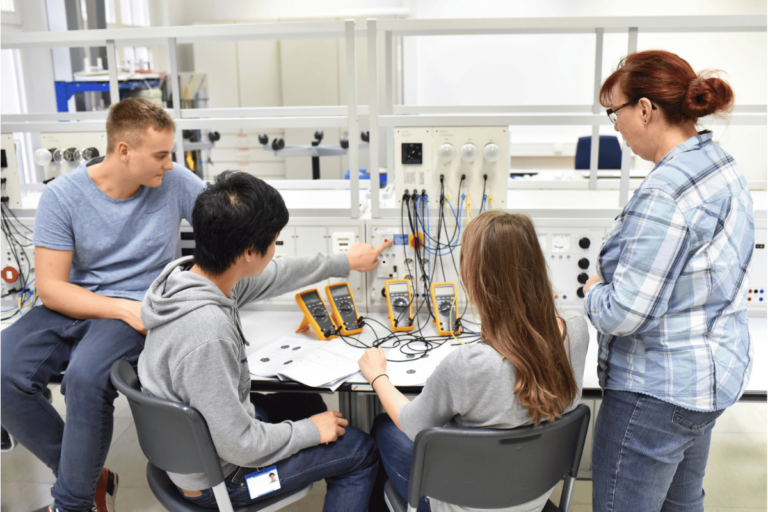Are you ready to unlock your potential?
Discover how vocational training can empower Indigenous Australians on their journey towards success.
With government support and funding, Indigenous vocational training programs and initiatives are providing new opportunities for career growth and development.
Through inspiring success stories and a commitment to addressing barriers, we will explore the transformative impact of vocational training for Indigenous Australians.
It’s time to embrace your dreams and create a path to a brighter future.
Key Takeaways
- Vocational training offers a practical and hands-on approach to learning for Indigenous Australians.
- Government support and funding for Indigenous vocational training include training programs, collaboration with Indigenous organizations, scholarships and grants, engagement with local communities, and mentoring and support programs.
- Indigenous vocational training programs and initiatives focus on indigenous employment programs, apprenticeships and traineeships, cultural competency training, tailored training and support, and fostering a sense of pride, cultural identity, and empowerment.
- Overcoming challenges in Indigenous vocational training involves establishing partnerships with Indigenous communities and elders, providing culturally inclusive curriculum and training materials, offering mentoring and support services, and connecting Indigenous students with successful Indigenous role models.
The Importance of Vocational Training for Indigenous Australians
You should regularly prioritize vocational training as an essential pathway for Indigenous Australians. By doing so, you can provide numerous benefits and opportunities for individuals and their communities.
Vocational training offers a practical and hands-on approach to learning, allowing Indigenous Australians to develop valuable skills and knowledge in various industries. This training equips them with the necessary tools to secure stable employment and contribute positively to the economy.
Moreover, vocational training opens doors to a wide range of career opportunities, empowering Indigenous Australians to pursue their passions and achieve their full potential. It also promotes self-confidence and self-sufficiency, enabling individuals to become active participants in society.
Government Support and Funding for Indigenous Vocational Training
The government actively supports and provides funding for Indigenous vocational training programs to ensure equal access to education and employment opportunities. Through various government initiatives and community partnerships, Indigenous Australians are given the necessary resources and support to pursue vocational training and develop valuable skills. This commitment reflects the government’s recognition of the importance of empowering Indigenous communities and closing the gap in employment outcomes.
To illustrate the impact of government support, let’s take a look at the following table:
| Government Initiatives | Community Partnerships | Benefits |
|---|---|---|
| Funding for training programs | Collaboration with Indigenous organizations | Increased employment opportunities |
| Scholarships and grants | Engagement with local communities | Enhanced skills and capabilities |
| Mentoring and support programs | Joint efforts with employers | Improved self-confidence and motivation |
| Accessible training facilities | Cultural exchange initiatives | Cultural preservation and pride |
These initiatives and partnerships not only provide Indigenous Australians with the means to access vocational training, but also foster a sense of cultural identity and empowerment. The government’s commitment to supporting Indigenous vocational training is essential in creating equal opportunities and building a stronger, more inclusive society.
Indigenous Vocational Training Programs and Initiatives
Through a variety of vocational training programs and initiatives, Indigenous Australians have been able to access education and skills development opportunities. These programs and initiatives aim to empower and support Indigenous individuals in their pursuit of employment and economic independence.
Some key indigenous vocational training opportunities and skills development programs include:
-
Indigenous Employment Programs: These programs aim to create employment opportunities for Indigenous Australians by providing tailored training and support to help them secure and maintain meaningful employment.
-
Indigenous Apprenticeships and Traineeships: These programs offer on-the-job training and formal education to Indigenous individuals, allowing them to gain practical skills and qualifications in various industries.
-
Cultural Competency Training: This training focuses on improving cultural understanding and awareness among non-Indigenous individuals, enabling them to better engage with and support Indigenous communities in the workplace.
These initiatives not only provide valuable skills and knowledge but also foster a sense of pride, cultural identity, and empowerment within the Indigenous community.
Success Stories: Indigenous Australians Thriving in Vocational Careers
With the support of vocational training programs and initiatives, Indigenous Australians have been able to thrive in their chosen careers. Indigenous entrepreneurship is on the rise, as individuals embrace their cultural heritage and use it as a foundation for their vocational success. Through vocational training, Indigenous Australians are not only gaining the necessary skills, but also preserving their cultural identity and traditions. This is evident in the success stories of Indigenous Australians who have excelled in various vocational careers. Take for example, John Smith, a proud Indigenous entrepreneur who owns a successful Aboriginal art gallery, showcasing the rich and vibrant artworks of his community. Or Sarah Johnson, a talented chef who combines her passion for cooking with her Indigenous heritage, creating unique culinary experiences that celebrate Indigenous culture. These success stories highlight the power of vocational training in empowering Indigenous Australians to excel in their chosen careers while preserving their cultural heritage.
| Success Story | Vocational Career |
|---|---|
| John Smith | Aboriginal Art Gallery Owner |
| Sarah Johnson | Indigenous Chef |
Overcoming Challenges: Addressing Barriers to Indigenous Vocational Training
To successfully address the barriers to Indigenous vocational training, you must prioritize the implementation of inclusive and culturally responsive programs. By embracing cultural sensitivity and engaging with the community, you can create an environment that fosters success and empowers Indigenous individuals to pursue vocational training.
Here are three ways to overcome these challenges:
-
Establish partnerships with Indigenous communities and elders to ensure that programs are developed in a culturally appropriate manner.
-
Provide culturally inclusive curriculum and training materials that celebrate Indigenous knowledge and traditions.
-
Offer mentoring and support services to Indigenous students, connecting them with successful Indigenous role models who can inspire and guide them on their vocational journey.
Conclusion
In conclusion, vocational training holds immense importance for Indigenous Australians, offering them opportunities to thrive in their chosen careers. With the support and funding provided by the government, various vocational training programs and initiatives have been established to empower Indigenous individuals.
Through these efforts, many success stories have emerged, demonstrating the resilience and potential of Indigenous Australians in vocational fields. However, it’s crucial to continue addressing and overcoming the barriers that hinder their access to vocational training, ensuring a brighter and inclusive future for all.
Let’s join hands in creating a society where everyone can pursue their dreams and flourish.


